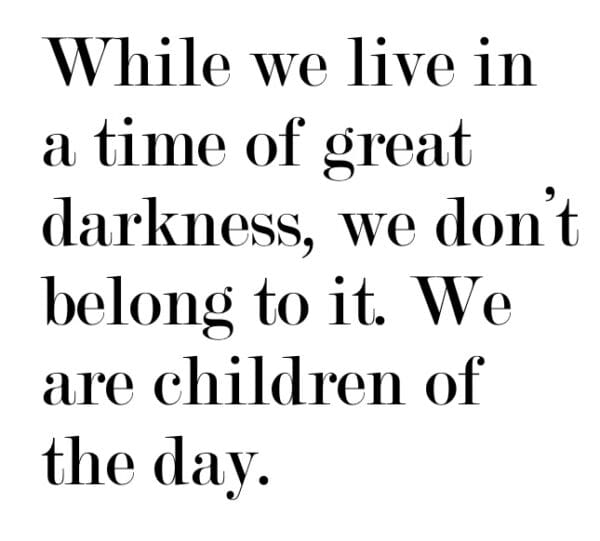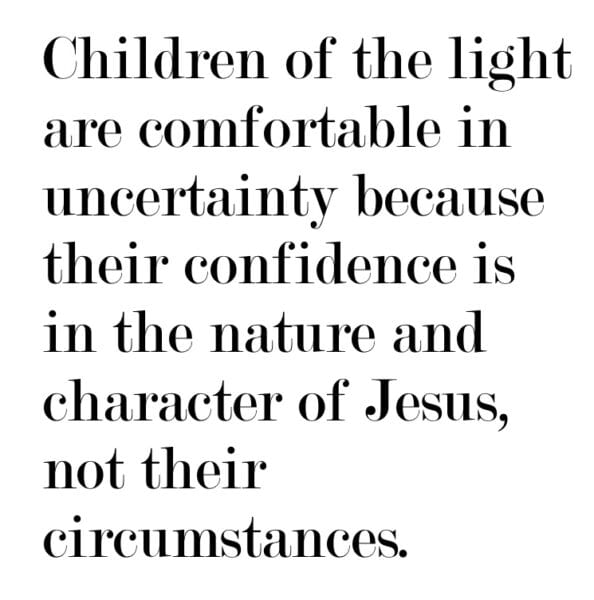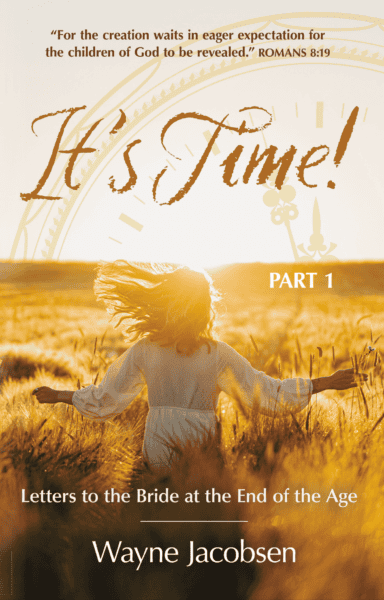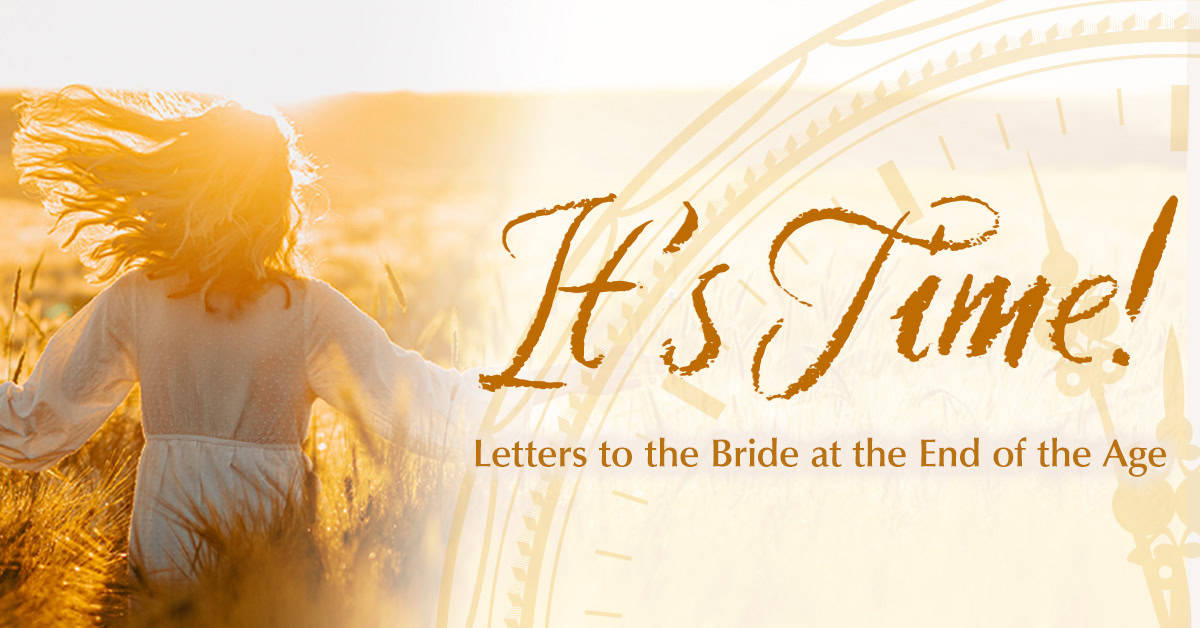Chapter 19: Children of the Day
Note: This is the nineteenth in a series of letters written for those living at the end of the age, whenever that comes in the next fifteen years or the next one hundred and fifty years. We have already released the first part of this book in print. You can also access the previous chapters here. If you are not already subscribed to this blog and want to ensure you don’t miss any of them, you can add your name here.
_________________________________
How can you write with such conviction about these things when you hold to a point of view a lot of other Christians don’t share? Don’t get me wrong, my heart is in sync with almost everything you’ve written, but I’m always second-guessing myself because I know so few people who see it the way I do.
Marcellus, basketball coach and father of two in Virginia
Marcellus,
First, if I had followed the Christian crowd throughout my life, I wouldn’t know Jesus the way I know him today. I didn’t start out to be a nonconformist. In my early days, I could work Christianity as well as anyone, and I so much wanted its affirmation. But the choices I was presented with kept knocking me off that path, either because I couldn’t compromise something I knew to be true or because Jesus invited me in a different direction.
That used to frustrate me. Why couldn’t I fit in like everyone else? It wasn’t because I thought I was wiser; I just could not do otherwise. I love that you second-guess yourself if that doesn’t overwhelm you or dissuade you from following him. Humility, as I wrote about earlier, is a gift, especially when we recognize that we only see in part. I hope this book encourages people like you to follow their heart without the arrogance of thinking they have all the answers. There’s much I don’t see and don’t know, but I try to follow where he leads.
At the same time, I don’t mind expressing what I see as honestly as I can and entrusting it to the reader to discern what is true. I know many will reject much of this book, but I am not trying to convince people who are locked into Christianity as a religion, but rather to encourage those who seek a more authentic faith in Jesus than what it can sustain.
Jesus warned us that the broad road leads to destruction; only the narrow path leads to life. I can’t help it if few people want to follow it. Twelve men went into Canaan to spy out the land, but only two thought God big enough to give it to them. No one would face the giant Goliath, except David, the shepherd boy. Jesus miraculously fed five thousand people, who abandoned him the next day when he spoke words they didn’t understand. At the end of his ministry, Paul said that “all in Asia” had deserted him, including some of the New Testament’s key congregations.
What it takes to embrace genuine life doesn’t seem to sustain crowds. Even Jesus wondered if he would still find faith on the earth when he returned (Luke 18:8). Resisting the darkness to keep our faith in him is challenging for any of us. It is not easy to deviate from the crowd and suffer the judgments of others. Because we mistakenly measure success in this kingdom by crowd size, book sales, or Internet followers, the temptation to distort the life of Jesus for popularity and money is ever-present, and the person succumbing to it can convince himself that God is leading them.
Whenever the person of Jesus is displaced at the center of our faith so that we follow a program or agenda in his place, we are on a road to disaster. That’s why finding our affirmation in the acclaim of the masses won’t draw us more deeply into him. Following him in whatever he reveals to you is not a matter of thinking you’re better or wiser than others; it is simply being genuine with the light you see. That will serve you well in the days to come.
Children of the Light
Paul warned us that the Day of the Lord would come as a thief in the night, taking many by surprise. “While people are saying, ‘Peace and security,’ destruction will come upon them suddenly, like labor pains on a pregnant woman, and they will not escape.” (I Thessalonians 5:1-3)
Those are ominous words and have been used to terrify many in Christianity’s relentless strategy to manipulate people’s fears. But Paul didn’t stop there: “But you are not in the darkness so that this day should overtake you like a thief. For you are all sons of the light and sons of the day; we do not belong to the night or to the darkness…. He died for us so that, whether we are awake or asleep, we may live together with Him. Therefore encourage and build one another up, just as you are already doing.” (I Thess 5:4-5, 10-11)
“Live together with him” is such a beautiful phrase. That’s the theme of this book. We get to live with him no matter what comes, and he will take care of us. While we live in a time of great darkness, we don’t belong to it. We are children of the day. Our hope is firmly staked in a kingdom that embraces a reality far beyond this age.
The kingdom doesn’t come by human strategy and cannot be fulfilled by our religious institutions. Jesus didn’t give his followers an organization to protect, but his Spirit to follow. Yet, on the day he ascended, they were still looking for him to take control of the world on Israel’s behalf. If not now, when? His answer invited them to look in a different direction. “It is not for you to know the times or dates the Father has set by his own authority.” (Acts 1:7)
Those preoccupied with prophecies and dates are looking at the wrong horizon—where the sun sets, not where it rises. Children of the day have their eyes fixed on a different dimension where the kingdom of God thrives. Though it hasn’t yet come in its fullness, that is still their primary citizenship, and they are loyal to that kingdom above all else.
Instead of looking for political fulfillment, Jesus told them to wait! And wait they did, until the Spirit came upon them. They learned at the outset that God didn’t need them to bring the kingdom, but only respond when he does. What amazes me about the book of Acts is that nothing happened by their strategic planning or prayer meetings. Filled with the Spirit, they responded to what Jesus was doing around them. That’s what it means to live as children of the light.
Peter and John weren’t looking to heal a lame beggar at the temple; the opportunity crossed their path, and they were ready to respond. Afterwards, they weren’t tempted to start a supernatural ministry school to train others to repeat what they had done as a new evangelism strategy.
It wasn’t Peter’s idea to take the Gospel to Gentiles. God set up the circumstances through dreams and visions that Peter willingly followed, even beyond his prejudices. When the Spirit fell on them, Peter recognized that God had incorporated them into his kingdom. Then he had to come back and explain it to his fellow Jews, who were appalled at the story they heard.
Paul’s journeys did not result from structured itineraries, but from his willingness to follow the Spirit along the way. Everything helped shape that journey, from avoiding persecution to dreams that changed his plans. He even found passage to Rome as a prisoner, falsely accused by the religious leaders in Jerusalem, who had hoped to murder him.
Jesus wanted his followers to watch him work and respond rather than substitute their ingenuity and planning. They didn’t become champions of the political or religious world. They didn’t fit into either and were persecuted by both. They were lied about, stoned, imprisoned, and martyred, and yet the life of Jesus found a way through it all to reveal himself to the world.
Children of the light are not perfect people, but sensitive followers of Jesus, with a trust in him stronger than their own perspective.
Succumbing to the Night
It isn’t easy to live as children of the light when everything about this world seeks to draw us back into the darkness. It can happen so subtly that we don’t even realize it, until we feel empty and lost. Jesus warned his followers that the end of days would be particularly challenging to keep our hearts embedded in the light. “At that time many will fall away and will betray and hate one another, and many false prophets will arise and mislead many. Because of the multiplication of wickedness, the love of most will grow cold.” (Matthew 24:10-12) He added that the very elect would be deceived unless he cut the days short.
Whenever we abandon love for any other agenda, we are easily deceived by power, just like the Pharisees. They had divided the world into those who were acceptable to God and those who weren’t. They were more concerned about law than life and found it easy to hate those who were not like them. That’s why they didn’t recognize God’s Son when he stood right before them. They got caught up manipulating the politics of the day instead of looking for a city whose builder is God.
 We already see false prophets leading God’s people astray, putting their hope in a political leader who advances their desires. Even though he is the moral opposite of Jesus Christ, those prophets have anointed him as the political savior of Christianity, and by doing so, their love for God and others has grown cold. Those who follow them are playing in the realm of human power and have lost sight of the day.
We already see false prophets leading God’s people astray, putting their hope in a political leader who advances their desires. Even though he is the moral opposite of Jesus Christ, those prophets have anointed him as the political savior of Christianity, and by doing so, their love for God and others has grown cold. Those who follow them are playing in the realm of human power and have lost sight of the day.
They still give lip service to Jesus despite losing touch with his nature and love. They are so preoccupied with the quest for power to fulfill their ambitions or seven-mountain mandate, thinking the eternal kingdom can come by coercion, manipulation, and arrogance. And don’t think the same dynamics aren’t at work in the political left. This is not a contest between liberal and conservative, but between darkness and light. This is not about what policies you prefer, but the fear and anger that an elite class manipulates to gain power over a nation.
The majority Christian view has almost always been on the wrong side of historical crossroads—from crusades and inquisitions to colonial conquest and slavery to racism and Apartheid, even to Hitler’s rise in Nazi Germany. Whenever Christianity aligned itself with the power of empire, it was seduced into tactics of the night, forsaking the priorities of God’s kingdom. There was a day when you could engage the democratic process without compromising participation in Jesus’s kingdom, but that’s nearly impossible today. The amount of money, lies, and anger that are part of our process on both sides negates the love of Christ.
That’s why many feel they just don’t fit in anymore—not to the religious environment they grew up in or the political party they championed at a younger age. Over the last thirty years, Jesus has been calling his bride back to himself, raising up followers who can see through the illusion of Christianity as a human-built religion made up of doctrines and regulations that emptied the cross of its power.
Sadly, some of those have gone on to try to recreate their own systems promising a more authentic experience and have been found wanting. But others have spent time in the wilderness of faith, looking for the truth and community that only Jesus can provide. That has taken many of them out of the institutions in which their faith was nurtured so that it could grow. They have been scorned and mocked, the quality of their faith questioned because they no longer conformed to the expectations of their family and friends.
In the process, however, they have reconnected to Jesus as a real presence. Their faith sent roots deep into God’s character and nature. Trusting in his love for them, they know how Father’s love holds them in the storm and how his presence and wisdom can guide them through anything. They have become children of the day without the fear or anger that others can manipulate.
Simeon and Anna
Children of the day were like Simeon and Anna when Jesus first came—two elderly people who hoped they would see the Messiah before death. Sure enough, in the temple courts, they saw an infant barely a month old and recognized in him the salvation of Israel. They saw in that baby a reality that more educated minds couldn’t recognize in a thirty-something man who had been healing and teaching throughout Israel.
They were tuned into a reality others could not see. Many in Israel were so focused on overthrowing Rome and claiming their country back that they missed him when he came with a greater redemption than political change could accomplish. They were not ready to embrace the infant at the temple, or the itinerant preacher who spoke wisdom they could not manipulate for their ends.
In the last days, people like Simeon and Anna will wait patiently for a promise against all hope. They will see the signs leading to his return. They will see him standing at the door, ready to fulfill in his own humanity what God had in mind from the Creation of the world. The darkness of those days won’t overwhelm them because their eyes are fixed on a brighter light.
The final chapter of redemption’s story is about to be written. This is a contest for the soul of the universe, pitting love and light against selfishness and darkness. Some live oblivious to this conflict, while others are discerningly aware.
In preparation for those days, he is calling a people who will bear his glory in the world. They will be known for their love and for upholding God’s justice in treating others with graciousness and compassion.
Comfortable in Uncertainty
The greatest joy of finding security in the presence of Jesus is that people no longer seek it from worldly circumstances. Confident in his love and care, they realize he can guide them through anything. Their comfort is set to his presence, not their desired outcomes.
Years ago, I began to meet people who were comfortable with uncertainty. I was intrigued because it seemed so foreign to me. My Type-A personality was more inclined to manipulate my circumstances, or more honestly, trying to enlist God to do so, for whatever I desired. It just so rarely worked because God was not invested in my agenda. Living that way was exhausting, borrowing anxiety from future events that never happened and for which there was no provision. 
I was intrigued by those who could take each day as it came. They didn’t have a lot of resources in earthly terms, but didn’t seem to need them. They were confident that God would give them what they needed when the time came. They learned to hold their fears of the future in suspicion because they could rarely foresee accurately what was to come. Never panicking, never manipulating, and never fearful, they walk with a growing trust in the Father.
Through crisis and tragedy, they had learned that God was faithful to provide for them each day whatever they needed. Worrying about the future became unnecessary. They came to see that God’s grace, like his provision, is served up in daily doses. We can be so distracted by our imagined future that we miss how he wants to guide us today.
These were the people I wanted to be near, for they were at peace in times of extremity, able to listen and respond to Jesus’s leading. Also, they reflected his character invitingly, being people of compassion, integrity, and gentleness. Being with them constantly refreshed me and made me long to learn how to trust God like they did.
All the while, Jesus kept inviting me to find fulfillment in his desires and purpose instead of mine. That also came through moments of extremity and frustration when he provided answers I would never have contemplated. My anxieties began to whither, and with them came the exhaustion of serving them.
Children of the light are comfortable in uncertainty because their confidence is in the nature and character of Jesus, not their circumstances. How do you learn to live this way? It won’t come from a book; it will come from interacting with him through your anxieties, scheming, and struggles. As you learn how unhelpful it is to try to control the outcomes of your own life, you’ll discover a better life awaits.
Slowly, a growing trust in Father’s love will push aside the need to have circumstances turn out the way you prefer. Instead of being frustrated about what he isn’t doing, you’ll watch him care for you through times of struggle and pain in ways you’d never have imagined. On the day you realize he knows best about everything in your life, you’ll find yourself comfortable in the uncertainties of life.
That will allow Jesus’s character to find a home in you. Without the anxieties of what may come, you’ll be more present in the moment with his compassion and kindness toward others. Then you’ll not only live in that light, but you will become the light for others to see the glory of God’s goodness.
_________________________________
 Order Part 1 of It’s Time from Amazon in Kindle or paperback, or read previous chapters online.
Order Part 1 of It’s Time from Amazon in Kindle or paperback, or read previous chapters online.




